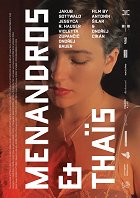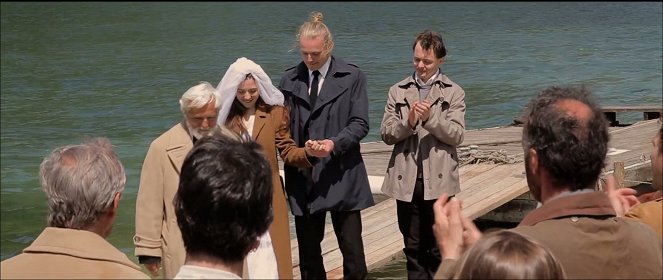Kamera:
Šimon DvořáčekMusik:
Hans WagnerBesetzung:
Jakub Gottwald, Jessyca R. Hauser, Ondřej Bauer, Violetta Zupančič, Rudolf Stärz, Pavel Ponocný, Tomáš Jeřábek, Phillippa Galli, Petr Vančura (mehr)Inhalte(1)
Ein surrealer Sandalenfilm nach den Schundromanen der Spätantike. Die Antike und die Gegenwart, die Sprachen Tschechisch und Deutsch vermengen sich. Thaïs wird während ihrer Hochzeit mit Menandros von Piraten geraubt. Auf der Suche nach ihr verwandelt sich der Bräutigam in ein blutrünstiges Monster, seinem Pferd wachsen Flügel, eine Hexe verspricht ihn einer anderen Frau, König Xerxes lässt ihn entmannen, aber am Ende geht trotzdem alles glücklich aus. Oder doch nicht? (Aerofilms)
(mehr)Videos (1)
Kritiken (2)
Sofern jemand diesen Streifen ohne Gehirschädigung zu Ende schauen kann, nur um sich zu überzeugen, dass sich mit begrenzten Mitteln kein antikes Epos drehen lässt, so ist er a) ein Märtyrer b) ein Masochist c) ein authentischer Rezessist. Es ist eine dilletantische Seance mit Deklamationen, Philologie und Surrealismus für Anfänger. Qualvoll. All dies jenem "neuen" (angeblich) Zweig des tschechischen Filmbaumes zuzuordnen, welcher das Ganze anders angeht, wäre ein Fehltritt. Im Grunde genommen ist das hier im Kern ein klassiches "neunziger-Jahre-Meta-Makabertum“. Der Zelenka-Stil, jedoch vollends ohne seine Geschicklichkeit.
()
This is not an amateur pseudo-achievement made in an offhand manner, but a consciously conceived and, mainly, erudite variation on ancient epics. It’s true that it makes very little sense to rank this film alongside contemporary Czech films made by the younger generation of filmmakers, but only in the sense that experimentation and informed wordplay necessarily stand apart from everything else, especially conventional narratives that pick up techniques at foreign festivals. To criticise an intentionally theatrical project by people working in modern theatre simply indicates a sheer lack of understanding and a failure to accept the concept. The merits of Antonín Šilar and Ondřej Cikán’s film lie in its consistent and informed adherence to the ancient epics, not only in their narrative composition, typical motifs and formulas, but also in their ahistorical nature and the mythical world’s relationship to contemporary reality. The film takes these attributes from Cikán’s book of the same name, which he had written after years of studying antiquity. The adaptation adds the imaginative staging of individual scenes and images, combining the techniques of modern scenography, imaginative set design and punkish low-budget aesthetics. At the same time, the contrast between the mythical story, the modern presentation and the creative filming gives rise to a whole that simultaneously deconstructs and strengthens the ancient stories.
()



Werbung